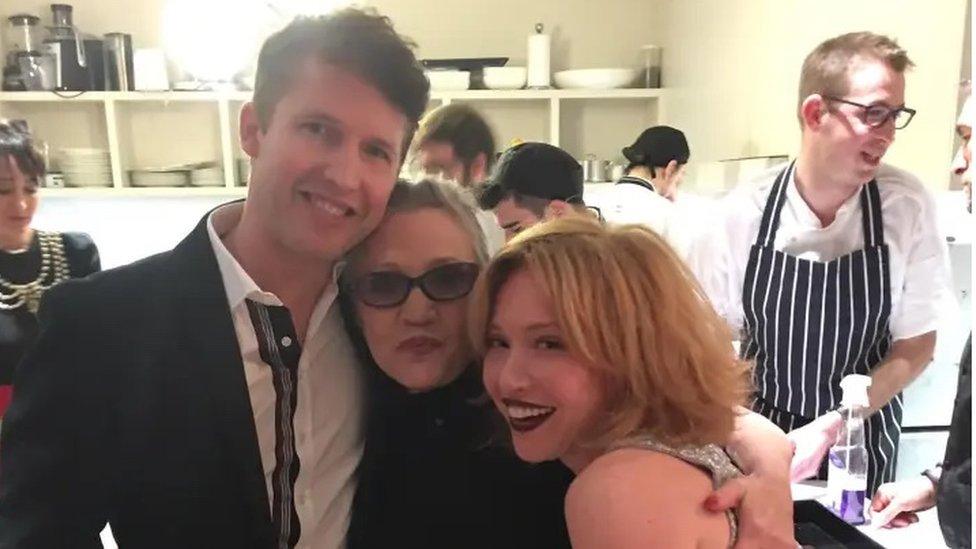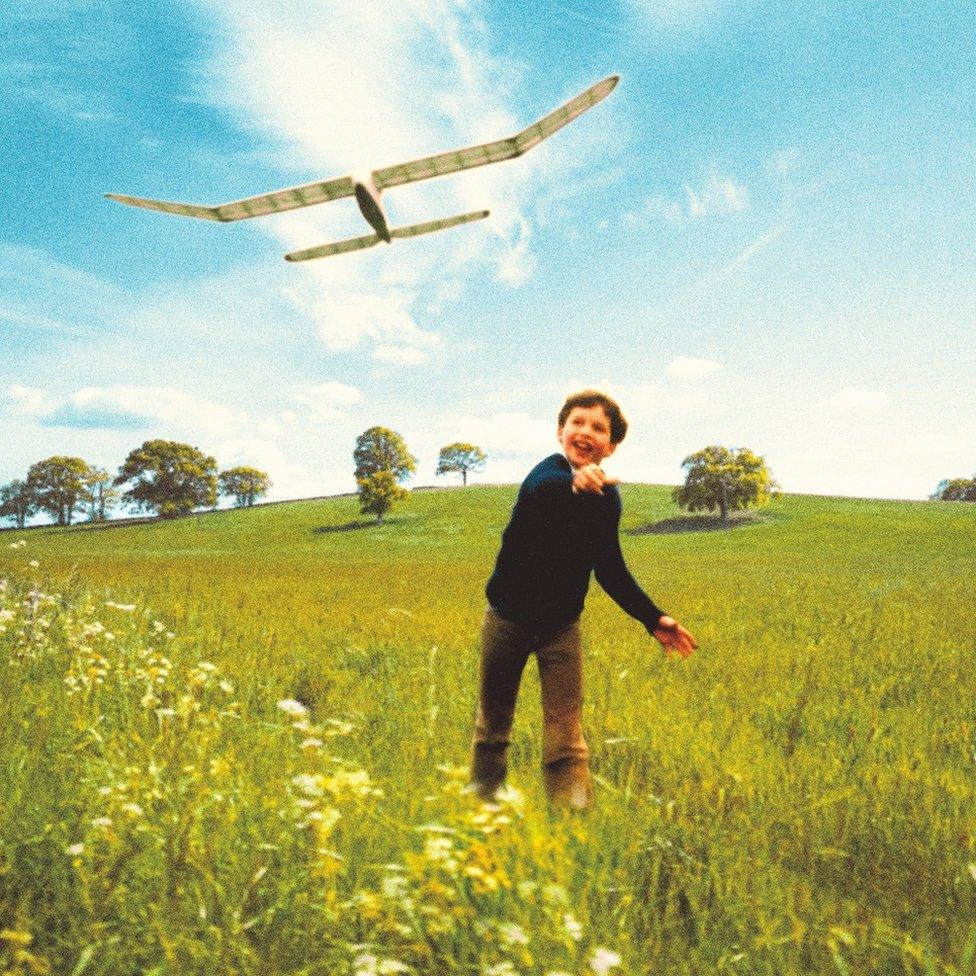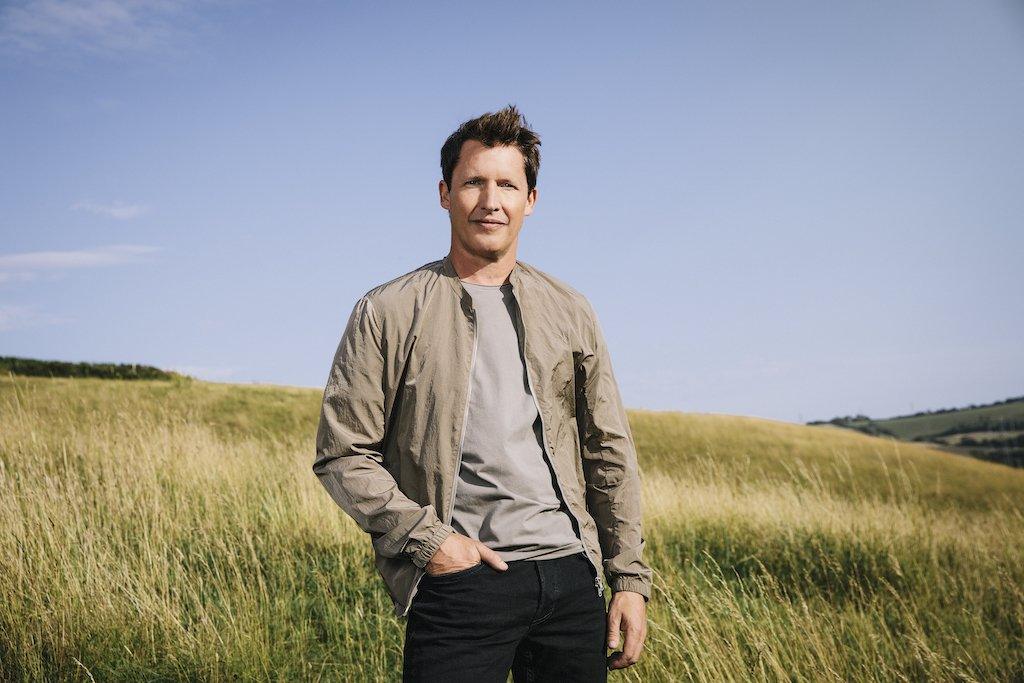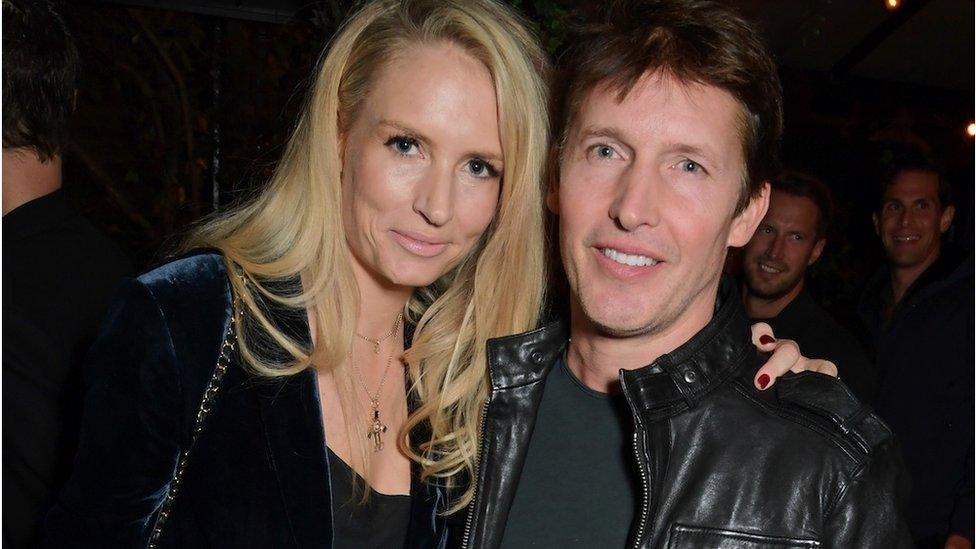James Blunt on his 'made-up' memoir, Carrie Fisher and losing a child
- Published

The star still draws huge crowds as he prepares to release his seventh album and a "made up" memoir
It's 11am and James Blunt is polishing off a pork pie.
"This is breakfast," he explains as his Zoom image comes into focus. "We just moved house, so what else can you do? You take whatever's on offer."
We're speaking on the morning after his ninth wedding anniversary, and there are builders trooping through the kitchen, so you'd forgive the singer if he was a little distracted.
In the event, he's anything but. Fuelled by cold meats, Blunt is alert, engaged, prepared for action. Maybe it's the military training...
He's here to discuss two projects: an album (his seventh) and a memoir (his first).
The book is a treasure trove of tall tales, from the time Blunt sold his sister on eBay, to his covert trysts with Pussycat Doll Nicole Scherzinger. It even includes a major political scoop: Blunt knows why Boris Johnson needed an £800,000 loan when he was prime minister.
It comes with a hefty legal disclaimer that "nothing herein should be construed to represent a true or accurate representation of the actual events" - and Blunt suggests his Hollywood anecdotes may be "embellished", half-remembered or "completely made up".
"I genuinely don't remember that much," he laughs. "Maybe it's the sagging of the brain with alcohol."
His stories are wickedly funny but, unexpectedly, the album is more revealing - confronting themes of grief, death, love, addiction and ageing with a simple, emotional honesty.
There's only one significant overlap: a moving tribute to the late Star Wars actress Carrie Fisher, who befriended Blunt in 2003 and offered him a home in Beverly Hills while he recorded his debut album.
He wrote You're Beautiful in her house, recorded Goodbye My Lover in the bathroom while tripping on hash brownies, and named the album Back To Bedlam "because of the madhouse from which it came".

Blunt counted Stars Wars actress Carrie Fisher (centre) as one of his closest friends
The pair formed a lasting bond. He called Fisher his "American mother" and she was godmother to his son. In the book, he reveals she visited him in London the night before she died in 2016.
By that point, her addictions had returned. She arrived carrying an eight-ball of cocaine, and Blunt feels a residual guilt that he didn't make a more forceful attempt to confront her substance abuse. Instead, he confesses, he had previously taken drugs with her, hoping to steer her away more gradually.
"It's a tough one," he says. "Some people will just do their thing and it's impossible to help them. But should one have tried harder? Yeah, I think so.
"Would it have been worth losing a friend by trying to help? Yeah, it probably would have been."
Grief-stricken, he opted out of Fisher's funeral (Fisher's daughter, Billie, holds Blunt partially responsible for her death, he says). It was only years later on a pilgrimage to her house, that he finally said goodbye, with tears streaming down his face.
He recounts that moment in a song called Dark Thought. "If I wasn't there, I'm sorry," he remembers telling his friend.
In the book, he adds a twist: as he cried on Fisher's driveway, a busload of sightseers pulled up and their tour guide announced: "As you can tell, some fans are still deeply moved by Carrie's passing."
"If she'd been watching," Blunt observes, "she would have laughed her head off."

Blunt's autobiography casts an eye over his childhood and his rise to fame
If the book is played for laughs, that's partly by design.
"I'm always telling the same stories and my wife eventually told me, 'Write them down and then you don't have to repeat them again'."
Music, by contrast, is the place where he conveys his true feelings.
"I've always struggled to communicate emotions in close relationships," he says. "My parents and my sisters will just kind of nod and grunt at each other, but we certainly don't divulge emotion.
"And the way I can do it is write a song and hope that someone will hear it."
An armchair psychologist would attribute this to his upbringing: sent to boarding school aged seven, he quips that "my parents didn't get in touch again 'til I was famous". He later spent six years in the army, and witnessed horrific war crimes during the 1999 Kosovo war.
It's not a massive leap to suggest those formative experiences forged his emotional armour.
"I'm a very well balanced and rounded human being," he jokes. "And I think that's solely to do with those experiences of boarding school."
Self-deprecating humour aside, he says school was "pretty messed up", while the army taught him self-reliance. Success, however, was something he couldn't cope with alone.
"I needed my family. I needed normality. I needed the love of my parents to tell me to stop being so spoiled, to stop thinking I'm bigger than anyone else, just because my music was kicking off."

Blunt was the UK's biggest-selling artist of the 2000s
Blunt's fame didn't arrive overnight - just 482 people bought his debut album during its first week of release - but when it came, it came fast.
Back To Bedlam sold more than 11 million copies worldwide. In the US, You're Beautiful became the first British single to top the Billboard charts for nine years, and Blunt was nominated for five Grammy Awards.
The backlash was harsh. "Illegal music isn't killing the music industry, James Blunt is," declared a typical article in The Sun. Ahead of the 2006 Brit Awards, Paul Weller was asked to duet with the star. He said he'd rather eat his own excrement.
The star handled it all with the same bullet-proof good humour that made his X-formerly-known-as-Twitter posts go viral, external.
"It's all been part of the ride, and I don't mind it," he says of the criticisms. "Maybe some of the elements were warranted, but if I were bitter, I'd be mad. I've been so lucky."
The girl who never was
On his Instagram bio, Blunt jokes that You're Beautiful is "proof one hit is all you need" - but no record label would release someone's seventh album if it was doomed to failure.
The star's records still sell millions and, if you haven't been paying attention, you'd be surprised by how his sound has moved with the times. His latest, Who We Used To Be, even dips its toes into dance music on a pair of upbeat, euphoric tracks called Some Kind of Beautiful and Beside You.
"I guess living in Ibiza rubbed off on me eventually," laughs the star.
Several songs are dedicated to his wife Sofia - who he met in 2010 and married in 2014. He says their relationship opened up new avenues in his songwriting.
"I wrote You're Beautiful about a girl I'd seen on the subway for all of a second, but the person I'm married to means way more to me than a stranger on the underground."

Blunt married Sofia Wellesley, the granddaughter of Valerian Wellesley, 8th Duke of Wellington, in 2014
Every marriage is put to the test, however, and theirs is no exception.
"We had aspirations, simple aspirations," he says, choosing his words carefully. "Some of those we've achieved and some of those we haven't."
He is alluding to a song called The Girl That Never Was, which tells the heartbreaking story of a child they lost.
"We never should have picked a name, because now she has a face," he sings in hushed sorrow.
"The balance of emotion is tough," after such a devastating loss, he says.
"It's women who go through the main trauma, and the rest of us have to work out how best to help. I don't always know the answer."
Raw though it is, Blunt is proud of the track, calling it "the song of the album".
He hopes that acknowledging the pain will offer comfort to thousands who have been through a similar trauma. Sharing the experience brings him comfort in return.
"That's the gift of music," Blunt says. "I can express my innermost fears and frailties and people will say, 'I've gone through the same experience, I feel the same way. You're not a freak'.
"That's the real magic. That's why I enjoy playing live. Not because people are cheering for me, but because they're singing along and saying, 'I feel the same'."
Related topics
- Published14 November 2010
- Published8 November 2010